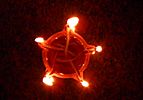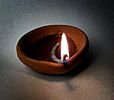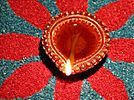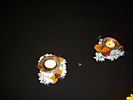Diya (light) facts for kids
Diya, or oil lamp, in different formations
|
||||||||
A Diya is a special type of oil lamp used in the Indian subcontinent, especially in India and Nepal. It is usually made from clay. It has a cotton wick that sits in ghee (a type of clarified butter) or vegetable oils. Diyas are lit for many important events and celebrations.
Contents
Why Diyas Are Important
Diyas are often lit during prayers, rituals, and ceremonies. You can find them in homes and temples. The warm, bright glow of a diya is thought to represent good things. These include knowledge, wisdom, and success.
Diyas also show the victory of light over darkness and good over evil. A great example of this is during the festival of Diwali.
Diyas and Diwali
Diwali is a very important Hindu festival celebrated every year. It celebrates the triumph of good over evil. This story comes from the ancient Hindu epic, the Ramayana.
The story tells how Rama, Sita, and Lakshmana returned home to Ayodhya. They came back after 14 years away, after defeating the evil king Ravana. To welcome them, the people of Ayodhya lit up the streets with diyas.
The word "Diwali" actually comes from the Sanskrit word "Deepavali." This means "row of lights," because "deep" means Diya and "avali" means row.
Diyas in Worship
Lit diyas are placed in front of gods and goddesses during prayers in temples. After the prayer, the flame is used to bless the people worshipping. This special ritual is called an arati.
A similar lamp, called a butter lamp, is also used in Tibetan Buddhist offerings. Diyas are also part of Hindu rituals related to Birth.
Different Kinds of Diyas
Diyas come in many shapes, sizes, and materials.
Materials Used
Most diyas are made from kiln-fired earthenware (clay). Metal lamps, often made of brass, are also common. These metal lamps are sometimes called Samai and can have many wicks.
Other materials are also used. Some floating lamps are made from leaves (called patravali). You can also find permanent lamps made of stones.
Wick Designs
The most common diyas have just one wick. However, you can also find diyas with two wicks. Some special lamps even have four, five, or seven wicks!
Special Designs
Some diyas are very decorative. The famous Nachiarkoil lamp, also known as the "Annam lamp", is a great example. It is made by a special community in Nachiyar Koil in Tamil Nadu, India.
See also
- Other lamps
- Butter lamp
- Navratra Akhand Jyoti
- Nachiarkoil lamp
- Nilavilakku lamp
- Sky lantern
- Types of Indian oil lamps
- Related topics
Images for kids
-
Tealight diyas used for decoration during Diwali
 | Audre Lorde |
 | John Berry Meachum |
 | Ferdinand Lee Barnett |










